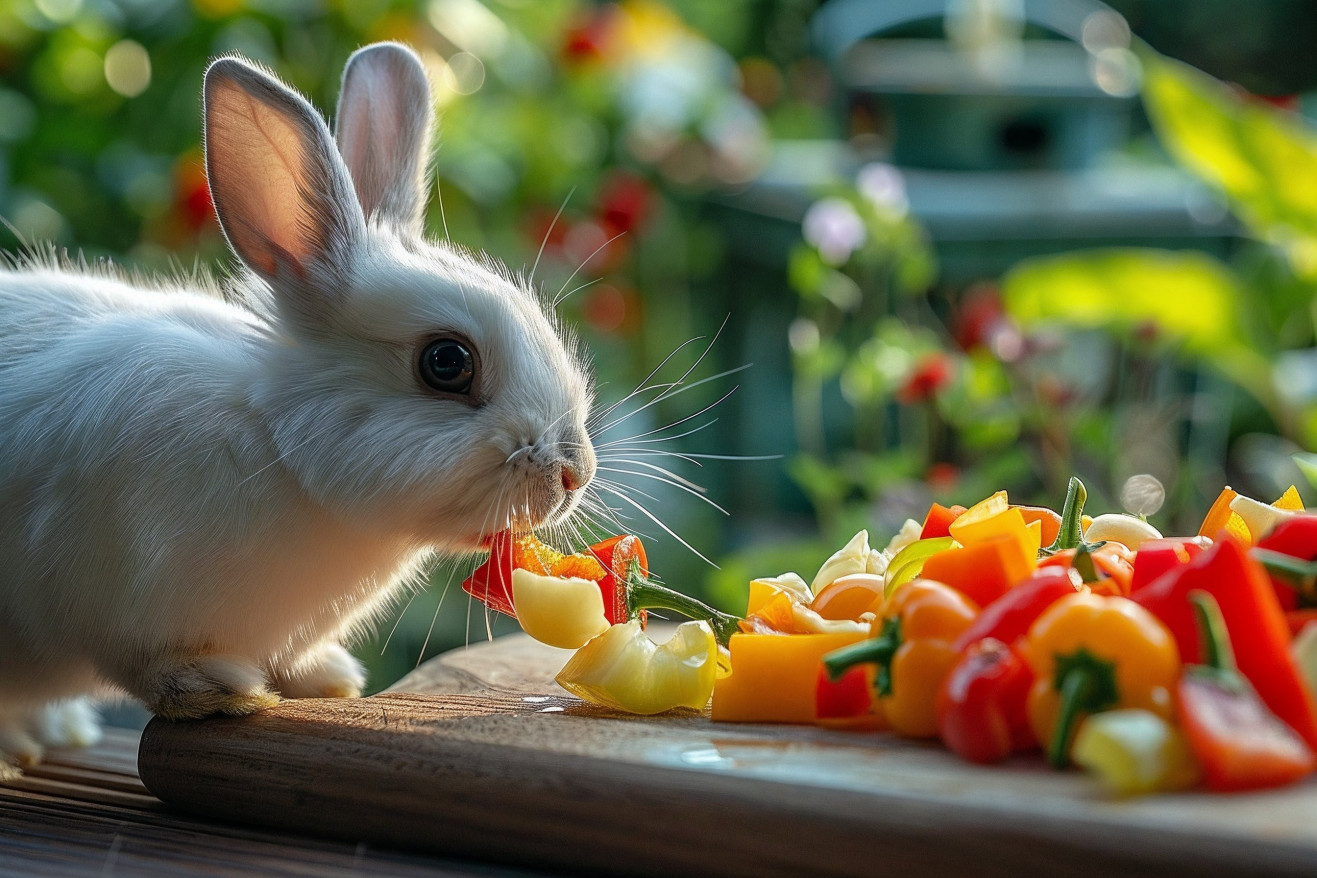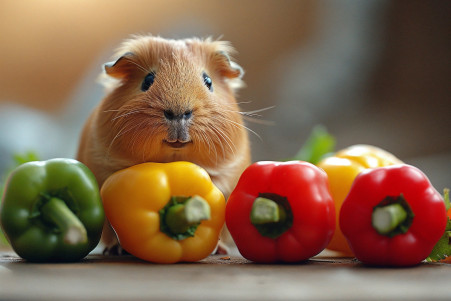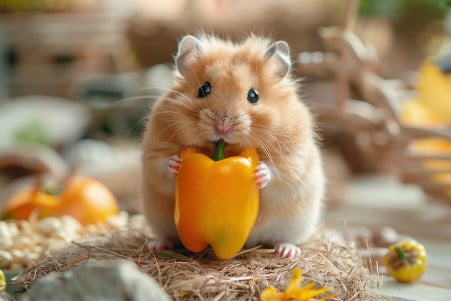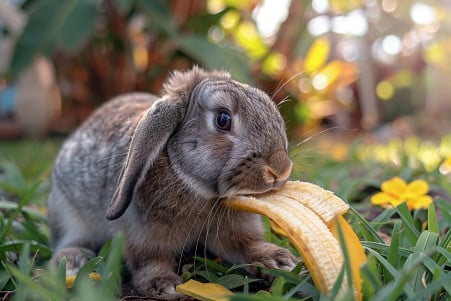Can Rabbits Eat Bell Peppers? Nutritional Insights for Your Pet
21 February 2024 • Updated 19 February 2024

Bell peppers are colorful and crisp, but can you share this veggie with your rabbit? You can, and it will be a healthy treat for your pet, as bell peppers can help with hydration and provide vitamins A and C.
Just make sure to give them to your rabbit in moderation and make sure they are fresh, clean, and seedless. Also, make sure to introduce them to your rabbit’s diet slowly to make sure they don’t cause any tummy troubles.
This article will take a deep dive into extensive research from veterinary nutritionists and rabbit nutrition studies to help you understand the place of bell peppers in a rabbit’s diet. We’ll look at rabbit digestion, the nutritional content of bell peppers, and how these things work together to impact a rabbit’s well-being.
Our hope is that this will give you a comprehensive understanding that will help you decide whether or not to add bell peppers to your pet’s diet.
Can rabbits eat bell peppers?
Bell Peppers: A Nutritional Powerhouse for Rabbits
Bell peppers are packed with nutrients that can have a big impact on a rabbit’s health when they are part of their diet. According to Medical News Today, bell peppers are a great source of important vitamins A and C. Vitamin A is important for vision and immune health, and vitamin C is important for collagen production and fighting free radicals. Both of these vitamins are important for overall rabbit health.
ScienceDirect also points out that the fiber in bell peppers is important for rabbit health. Fiber helps with gut motility, which is especially important for rabbits due to their unique digestive systems. In addition, the antioxidants in bell peppers help fight oxidative stress, which can help protect against certain diseases.
Bell peppers also help with hydration due to their high water content, which is important for urinary and digestive health, according to Protexin Vet. In addition, bell peppers are low in calories, which means they can be added to a rabbit’s diet without the risk of obesity that comes with high-calorie treats. This combination of nutrients helps meet a rabbit’s nutritional needs, making bell peppers a great addition to their diet.
Rabbit Digestive Health: The Importance of Knowing How Your Pet’s Digestive System Works
Rabbits have a unique digestive system that is very different from other companion animals. According to Purina Animal Nutrition, as hind-gut fermenters, rabbits depend on their cecum, a large organ that contains fiber-digesting microbes, to get energy and maintain digestive health. The high-quality fiber in bell peppers can help this process by supporting the important microbial community in the cecum.
Rabbits also need a balanced amount of fiber in their diet, and according to Supreme Petfoods, bell peppers can help meet this need while also providing valuable hydration. That said, when feeding bell peppers to your rabbit, it’s important to introduce them slowly to prevent digestive upset. This means starting with small amounts and watching your pet closely for any signs of problems.
In addition, Supreme Petfoods points out that the crunchiness of bell peppers can help promote good dental health by contributing to the natural wearing down of rabbits’ teeth, which grow continuously. By understanding these special dietary requirements and making sure to introduce bell peppers to their rabbits’ diets carefully, pet parents can help improve their rabbits’ digestive and dental well-being.
Weighing the Scales: Can Rabbits Eat Bell Peppers?
Feeding rabbits bell peppers can help them get more of the vitamins A and C they need to stay healthy and support their immune systems. As noted by World Rabbit Science, a balanced rabbit diet should meet the vitamin A requirement for vision and reproductive health.
However, vitamin A toxicity can occur with overconsumption, as shown in a study by Mary J. Kennett, published on PubMed. This study demonstrates the need for caution and balance when adding new foods to a rabbit’s diet.
Conversely, there are potential downsides to feeding rabbits bell peppers. While it’s rare, rabbits can experience gastrointestinal upset or an allergic reaction. This is why it’s important to follow safe feeding guidelines, including portion control and frequency, to avoid overfeeding and its potential consequences.
Furthermore, the results of a study on vitamin E therapy, published on PubMed, show the importance of balance when it comes to adding vitamins to a rabbit’s diet. When we aim to give our rabbits the best nutrition possible, it’s important to weigh the pros and cons of any food, taking into account that every rabbit will respond differently to different foods. With careful monitoring and responsible feeding, rabbits can eat bell peppers safely.
How to Introduce Bell Peppers to Your Rabbit
To make sure that your rabbit is safe and happy, there are some important steps to take when introducing bell peppers to their diet. First, make sure that you wash the peppers thoroughly to remove any pesticides or residues, as recommended by A-Z Animals.
Next, cut the bell peppers into small pieces that are easy for your rabbit to eat, making sure to remove the seeds and stems to avoid choking and indigestion, as advised by EarthEclipse.
Start by giving your rabbit small amounts of bell pepper so that you can see how they react to it, as suggested by Rabbits Life. To avoid giving your rabbit too much of a good thing and potentially causing nutritional imbalances, only give them bell peppers as a treat a few times a week.
Also, because every rabbit is different, pay attention to how your rabbit reacts to different colors of bell pepper, as the nutritional content can impact how well they digest it.
When you’re picking out bell peppers, make sure that you choose ones that are firm, bright, and free of soft spots or wrinkles to make sure that they’re fresh.
You can keep bell peppers in the refrigerator for 5–7 days, but keep in mind that green bell peppers may last longer than other colors.
Finally, always throw away any bell peppers that have started to go bad, such as those that have developed mold or become slimy, to make sure that you don’t make your rabbit sick. If you follow these tips, you can make sure that your rabbit enjoys bell peppers as a tasty and nutritious part of their well-rounded diet.
Final Thoughts: Bell Peppers Can Be a Healthy Treat for Rabbits
In summary, bell peppers can be a healthy and helpful addition to a rabbit’s diet, especially when given in moderation. Their nutritional content makes them a good fit for a rabbit’s dietary needs, as they are high in vitamins A and C, fiber, and water.
We’ve also seen that when included responsibly, they can help with hydration, dental health, and other aspects of a rabbit’s well-being, as long as they are introduced slowly and prepared properly.
It’s important to make sure you follow the recommended guidelines for how much to feed your rabbit and adjust the amount based on their size and individual dietary needs to prevent any digestive issues. Also, it’s important to remember that rabbits need a diverse diet, and adding bell peppers to their meals can help ensure they get a wider range of nutrients than they would from leafy greens alone.
As we conclude our investigation, let’s not forget the importance of a well-rounded, diverse diet for our furry friends. By adding bell peppers to their meals in a way that’s mindful and intentional, we can give them a tasty and nutritious treat that can help them live their best lives.


